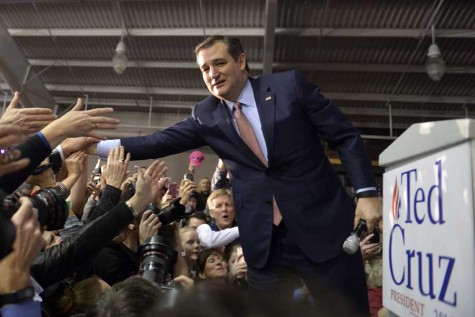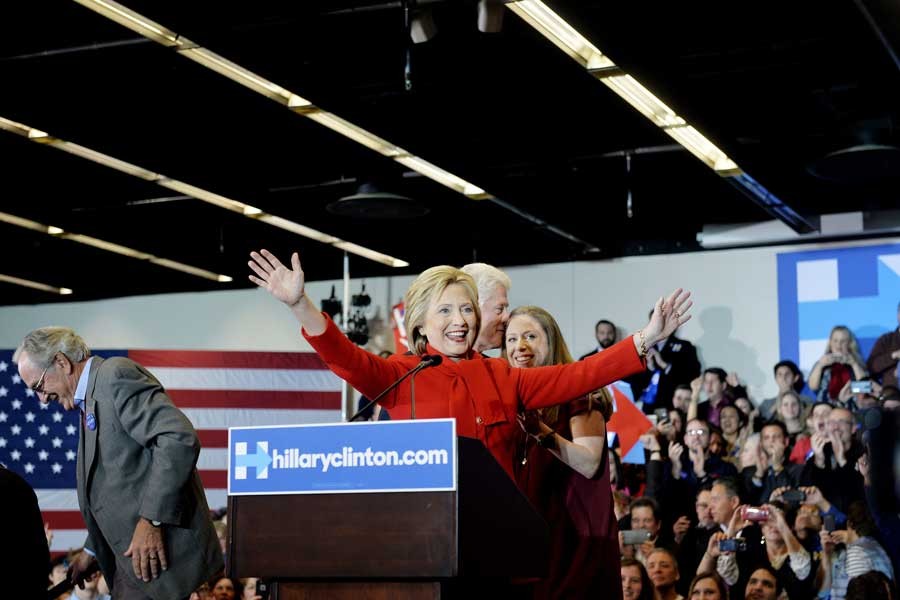Early voting sets tone for presidential election
Hillary Clinton speaks in Ankeny, Iowa, on Monday, Feb. 1, 2016. Clinton narrowly defeated Sen. Bernie Sanders in Monday’s Democratic Iowa caucus. (AftonbladetIBL/Zuma Press/TNS)
On Feb. 1, the race to the White House began with the Iowa caucus. The Iowa caucus was the first primary election held in the U.S., and according to CNN, it sets the tone for the rest of the presidential election.
“[Winning the Iowa caucus] can help establish a candidate’s viability. Winning Iowa doesn’t guarantee that you’ll be the nominee, but it’s better to win Iowa than lose Iowa,” social studies teacher Rodney Johnson said.

Former Secretary of State Hillary Clinton (D) and Texas Sen. Ted Cruz (R) won the Iowa caucus for their respective parties. However, Clinton only beat Vt. Sen. Bernie Sanders (D) by two delegates. Each district receives a certain number of delegates, and whoever wins each district gets the total number of delegates.
“It’s better to win Iowa than lose Iowa.”
— Social studies teacher Rodney Johnson
Controversy surrounds the recent caucus. According to CNN, six different county delegate votes were decided by a coin toss. As a result of these coin tosses, Clinton won a total of five state delegates and Sanders won one.
Contention has spread to other side of the aisle as well. Presidential candidate Donald Trump (R) has accused Cruz of stealing the Iowa caucus. Prior to the caucus, Cruz’s local campaign efforts told voters that neurosurgeon Ben Carson (R) was dropping his presidential bid.
Instead, Carson was returning to Florida instead of going on to campaign in New Hampshire. On his official campaign website, Carson issued a release calling these rumors “lies and dirty tricks.” He is not withdrawing his candidacy.
However, after the caucus, many candidates realized they were not viable enough to continue running. According to CNN, after the caucus on Feb. 1, former Md. Gov. Martin O’Malley and former Ark. Gov. Mike Huckabee dropped out of the race. On Feb. 3, Ky. Sen. Rand Paul and former Pa. Gov. Rick Santorum pulled out of the race as well.
The remaining candidates went to New Hampshire for the second primary contest, which took place on Feb. 9. Sanders and CEO Donald Trump (R) won the primary for their respective parties. After the New Hampshire primary, New Jersey Gov. Chris Christie, former Hewlett-Packard CEO Carly Fiorina and former Virginia Gov. Jim Gilmore dropped out as well.
Understanding the Caucus
To most students, the Iowa caucus seems to be a mystery. “I would say a majority of the school doesn’t know what the Iowa caucus is,” sophomore Zach Vest said.
The caucus is Iowa’s complex way of conducting their primary. Every state holds a primary election or caucus where registered citizens select candidates to receive the presidential nominations from their respective parties.
However, Iowa holds a caucus, which is different than primary elections. On caucus night, all registered voters arrive at their caucus location by 7 p.m. If voters arrive at 7:01, they are not allowed to participate.
Citizens vote at a variety of locations ranging from churches to restaurants. There may be multiple caucus locations in a precinct, or two precincts may caucus at the same location. A precinct is a small area of voters that may be comprised of half of a county to two counties, depending on population sizes. There are 1,683 precincts in Iowa, but only 99 counties.
Once voters arrive at their caucus, they are divided by political party. Republicans and Democrats are separated. Representatives for each candidate will speak to their respective party’s voters and urge caucus-goers to vote for their candidate.
After hearing these speeches, Republicans participate in a secret ballot, and their votes are counted. The Republican candidate that receives the most overall votes wins the state.
Democrats use a different system, however. Once Democrats hear speeches from these representatives, they divide themselves into groups based on which candidate they support. For example, in this caucus, voters split into three groups: a group that supported Clinton, a group that supported Sanders, and a group that supported O’Malley.
The number of people in each group are tallied, and if a candidate does not have support from at least fifteen percent of a precinct, then that candidate is deemed “nonviable,” and his or her supporters have to join another in order for their vote to be counted.
After the nonviable candidates are weeded out, the number of voters in each group is tallied and the number of citizens in each group is the number of votes that candidate receives.
Once a Democratic candidate wins a precinct, they receive an allotted number of state delegate votes. This number is based off the number of Democratic voters in previous recent elections.
Once a candidate wins the state for each party, whether they are a Republican or a Democrat, they then receive an allotted number of delegate votes.
The candidate who receives the most delegate votes will receive their party’s nomination for president. According to ABC News, the Democrat candidate who wins Iowa wins 44 delegate votes, while the Republican candidate receives 30 delegate votes. To win the Democratic nomination, a candidate must receive 2,382 delegate votes, and to win the Republican nomination a candidate must receive 1,237 delegate votes.
Typically, the candidate in each party who receives primary votes from the most states will become the official presidential candidate of that party.
Grace Mottley is a News Editor for The Patriot and jcpatriot.com.











